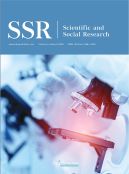Abstract
“The Adventures of Huckleberry Finn” is Mark Twain’s representative novel, in which the black slave Jim’s personal liberty has been the focus of critical attention. However, the white boy Huckleberry Finn’s freedom is taken for granted and therefore seldom mentioned. It can be argued that Huck can neither find real freedom in the seemingly civilized society nor at its opposite side. This thesis divides Huck’s adventure process into three parts, tracing his escaping from his father’s and the widow Douglas’ parenting patterns, his rifting journey down the Mississippi River on the raft and to the island as well as his vagrancy in mob-ruled communities. By doing so, it attempts to demonstrate the infeasibility of gaining individual freedom, the freedom of life and the civil freedom accordingly.
References
Smith DL, 1984, Huck, Jim, and American Racial Discourse. Mark Twain Journal, on Black Writers on “Adventures of Huckleberry Finn” One Hundred Years Later, 22(2): 4–12.
Twain M, Hearn HP, 1981, The Annotated Huckleberry Finn: Adventures of Huckleberry Finn, W. W. Norton & Company, New York.
Thoreau HD, 2005, Where I Lived and What I Lived For, Penguin Press, London.
Sun YZ, 2008, Classics of Western Thought, Foreign Language Teaching and Research Press, Beijing.
Kant I, 2004, Fundamental Principles of the Metaphysic of Morals, viewed May 15, 2009, https://www.gutenberg.org/files/5682/5682-h/5682-h.htm#link2H_4_0002
Barrie JM, Raquel Jaramillo, 2000, Peter Pan: The Original Tale of Neverland, Simon & Schuster, New York.
Smiley J, 1996, Say it Ain’t So, Huck: Second Thoughts on Mark Twain’s Masterpiece. Criticism, 1996: 61–67.
Mill JS, 1992, On Liberty and Utilitarianism, Bantam Books, New York.
Eliot TS, 1950, Introduction to Huckleberry Finn, in The Adventures of Huckleberry Finn, vii–xvi. Cresset Press, London.
